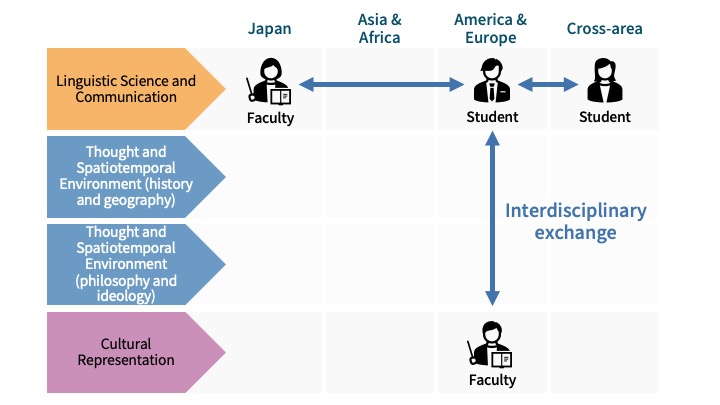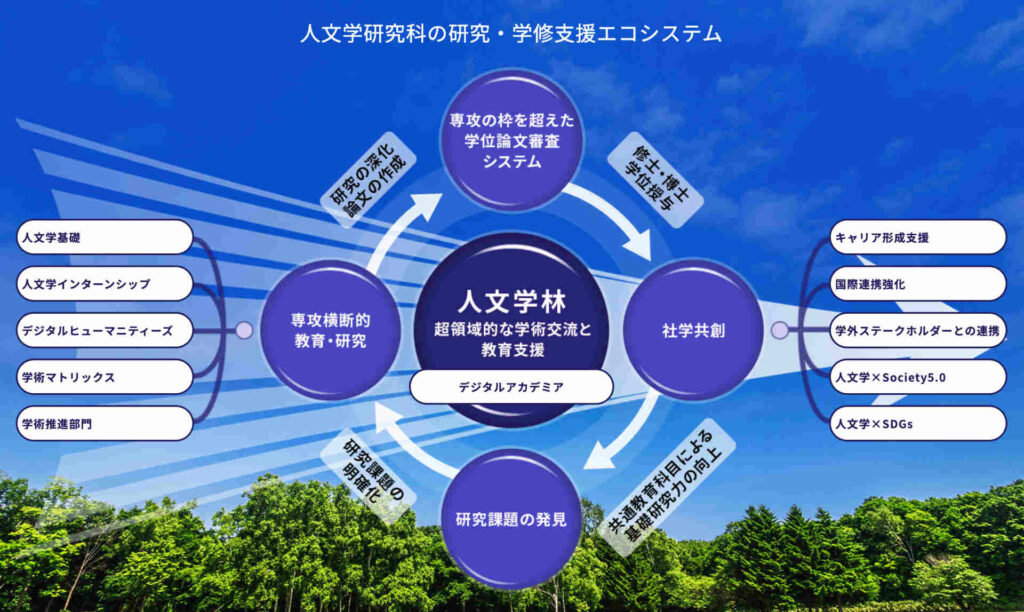


About INH
See the Interdisciplinary Network in the Humanities organization chart →
About INH
Interdisciplinary Network in the Humanities (INH) is positioned as a “cross-disciplinary and interdisciplinary research and education infrastructure” that spans the entire Graduate School of Humanities. While supporting research and education by traditional majors, it also plays a central role in promoting new initiatives, including collaboration with society and the use of digital technology.
The Mission of the Interdisciplinary Network in the Humanities
The Graduate School of Humanities at the University of Osaka is one of the largest graduate schools of humanities in Japan, consisting of five departments with approximately 250 faculty members and 550 graduate students. Interdisciplinary Network in the Humanities was established to maximize the educational and research potential of the graduate school.
Interdisciplinary Network in the Humanities is a structure that promotes interdisciplinary perspectives, international exchange, and collaboration with society that transcends the boundaries of majors. All faculty and students belong to this organization, which aims to promote cross-disciplinary research and education based on flexible ideas and dialogue without being bound by existing frameworks, thereby contributing to the achievement of the goals of the Graduate School.
At the core of this initiative is the concept of the "Academic Matrix." This framework is structured with four academic disciplines on the vertical axis—Linguistic and Communication Studies, Thought and Spatiotemporal Environment Studies (History and Geography), Thought and Spatiotemporal Environment Studies (Philosophy and Thought), and Cultural Representation Studies—and four geographic areas on the horizontal axis—Japan, Asia & Africa, the Americas & Europe, and Transregional Studies. Within this structure, we have established the "Digital Academia" system, which enables faculty and students to participate in interdisciplinary projects and educational programs while leveraging their respective expertise. This approach fosters not only specialized knowledge but also cross-disciplinary learning and research.

The management of INH subjects offered by the Graduate School, the consulting mentor system, the organization of academic events and the publications and are also important roles of INH. Through these activities, it serves as a platform for education and research that deepens cooperation with internal and external stakeholders and opens up new horizons for the humanities.
The concept of INH lies in applying traditional humanistic knowledge to contemporary society and aiming to create new academic disciplines. This approach, which balances in-depth academic pursuit with social contribution, expands conventional academic systems and carves out new possibilities for the humanities. It also involves the introduction of credit-bearing internships and activities that engage diverse societal actors beyond just researchers, with a view to contributing to both local and international communities.
Origin of the name Jinbun Gakurin (Interdisciplinary Network in the Humanities in Japanese)
The name "Jinbun gakurin" was inspired by the Chinese word "gakurin," which means a center of learning or a place where scholars gather.
The word "rin" in Jinbun gakurin which means "forest" in Japanese, suggests not a single tree, but a place of coexistence, like a forest where a variety of trees come together to form a rich ecosystem. While "jinbun gaku" means "humanities". The essence of a "humanities forest" is a place where each tree (representing researcher or student) has a different specialty or perspective, but they influence each other and encourage the creation of new knowledge.
This name expresses our respect for free and creative ideas, unconstrained by existing frameworks. We will not only connect diverse fields in the humanities, but also serve as a base for opening up new academic horizons in response to the needs of society and the times. We will play a role as a future-oriented education and research platform befitting the humanities of the 21st century.
Interdisciplinary Network in the Humanities Organization Chart
- Dean of the Interdisciplinary Network in the Humanities: Yoshiki Yamamoto (Dean of the Graduate School of Humanities)
- Chairman of the Interdisciplinary Network in the Humanities Management Committee: Naoya Unoda (Vice Dean for Discipinary Network in the Humanities, Graduate School of Humanities)
- Interdisciplinary Network in the Humanities Management Committee: Consists of the heads of each department and team
Education
| INH Subject Unit | Foundations of Humanities Team | Management of the Graduate School's common subjects "Foundations of Humanities (Dialogue with the Humanities)" and "Foundations of Humanities (Contemporary Liberal Arts)" |
| Internship Team | Management of the Graduate School common subjects "Humanities Internship" and "Humanities Practical Research" | |
| Digital Humanities Team | Administering the Graduate School's common subjects "Humanities and Digital Technology," "Introduction to Digital Humanities," and "Implementing Digital Humanities," managing the DH lab, and planning, operating, and hosting DH-related events | |
| Education Internationalization Team | Running the Euroculture Program at the University of Osaka | |
| Interdisciplinary Education Unit | Promoting interdisciplinary education, including the administration of the Global Humanities Research Exchange Program | |
| Degree Program Unit | Implementation of a consultation teacher (mentor) system that transcends major boundaries and the establishment of an advanced degree examination system | |
Research
| Research Promotion Unit | Promoting advanced academic activities that transcend the boundaries of majors and disseminating academic results to the public through publications such as the "Jinbungakurin Library" | |
| Journal Editing Unit | Jinbungakurin Editorial Team | Editing and publishing the academic journal Jinbungakurin |
| Memoirs Editorial Team | Editing and publishing the academic journal Memoirs of the Graduate School of Humanities | |
| Digital Academia Unit | Advanced academic support through the establishment and operation of the Digital Academia system | |
| Social Engagement Promotion Unit | Promoting social and academic co-creation through collaboration with external organizations and entities | |


